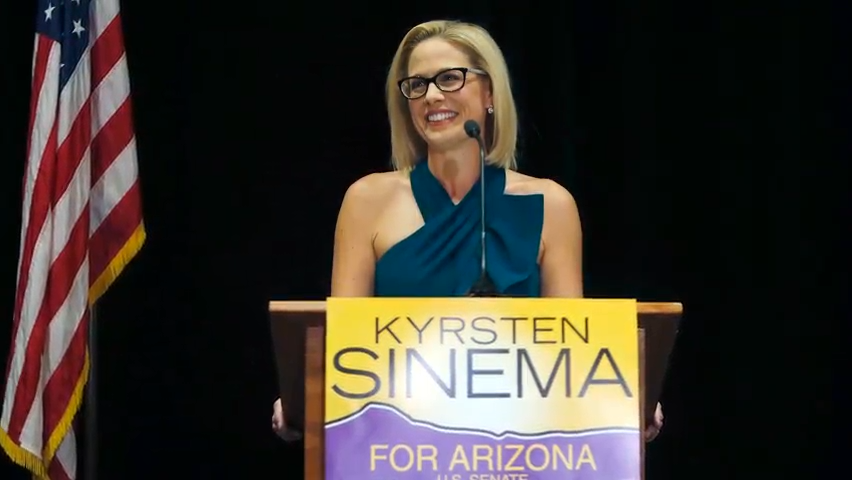With Joe Manchin not running, will the parties focus more on Kyrsten Sinema's Senate race?
- Oops!Something went wrong.Please try again later.
- Oops!Something went wrong.Please try again later.
National Republicans got welcome news Thursday that Democratic Sen. Joe Manchin will not seek reelection in West Virginia, a move that could free up some GOP resources but still leaves the future of Arizona’s Senate race up in the air.
Manchin’s decision wasn’t shocking considering his state’s recent, lopsided history of voting Republican.
But it comes as Sen. Kyrsten Sinema, I-Ariz., hasn’t clarified her political plans for 2024 and as Republicans may now look elsewhere for additional wins in their bid to retake the Senate.
A spokesperson for Sinema could not be reached for comment about her plans.
Sinema hasn’t officially said whether she plans to seek another six-year term, but her campaign spending throughout the year suggests she has been running all along.

Others also maintained a business-as-usual posture on Arizona’s Senate race after Manchin’s decision.
Sen. Steve Daines, R-Mont., who heads the National Republican Senatorial Committee, reacted to Manchin’s retirement announcement with expected confidence.
“We like our odds in West Virginia,” he said in a statement.
Tate Mitchell, a National Republican Senatorial Committee spokesperson, downplayed the effect of Manchin’s decision on the race in Arizona.
“Arizona has been and continues to be one of our top targets for 2024,” he said.
The prospect of a rare, three-way race in Arizona has added an air of uncertainty to what the state can expect.
Kari Lake formally entered the race for the GOP nomination last month with the endorsement of former President Donald Trump, making her the favorite in the Republican primary, but also raising concerns about whether she can win a general election after losing the gubernatorial election last year.
Pinal County Sheriff Mark Lamb entered the Republican race in April.
Rep. Ruben Gallego, D-Ariz., is the only prominent Democrat running for Sinema’s seat and his party has long planned to fight to win back the seat Sinema, as a Democrat, won for them in 2018.
The Democratic Senatorial Campaign Committee sought to connect the news in West Virginia to other races it views as winnable to protect the party’s two-seat majority.
“Democrats have multiple pathways to protect and strengthen our Senate majority and are in a strong position to achieve this goal,” said David Bergstein, a DSCC spokesperson said.
“In addition to defending our battle-tested incumbents, we’ve already expanded the battleground map to Texas and Florida, where formidable Democratic candidates are out-raising unpopular Republican incumbents and the DSCC is making investments to lay the groundwork for our campaigns’ victories.”
One reality for both sides is that the West Virginia race wasn’t going to drain either party’s bank account heavily. It is a small state with relatively low political advertising costs. By contrast, Arizona’s costs are on the higher end, and as a presidential battleground it will ensure empty TV time isn’t plentiful.
Amy Walter, publisher of the nonpartisan Cook Political Report, said she didn’t expect the West Virginia race to impact resources brought to Arizona’s Senate contest.
“This wasn’t a money issue. I don’t think that Democrats were going to spend in West Virginia. And even if they did, it wasn’t keeping money away from Arizona,” she said.
Erin Covey, an analyst with the nonpartisan Inside Elections, said the news in West Virginia may lead to a reassessment across the map for both parties.
“It raises the stakes for the Arizona Senate race and all the other battleground Senate races because now Democrats can’t afford to lose Arizona,” she said. “They’re going to need to hold Arizona and Michigan and all these other battleground seats, along with, of course, Ohio and Montana and the White House if they want to maintain control of the Senate.”
Before Manchin’s announcement, West Virginia was one of three key races that by themselves could flip control of the Senate and where the GOP seemed most focused. Ohio and Montana are the other races where incumbent Democrats seem especially vulnerable in generally Republican-leaning states.
Gallego’s campaign has already received some help from his party: In September, the Arizona Democratic Party gave him $10,000.
Lamb’s campaign has not yet received any funding from Republican party organizations. Lake’s campaign won’t report its finances until January.
This article originally appeared on Arizona Republic: Joe Manchin and Kyrsten Sinema: What does decision mean for Arizona?

